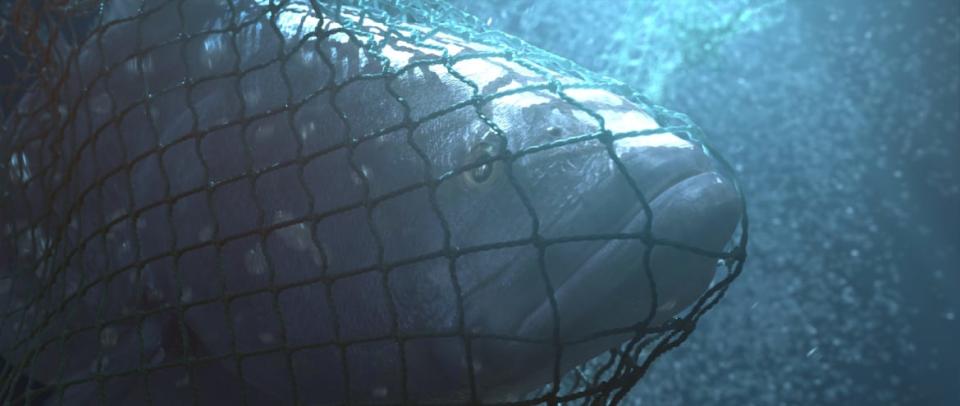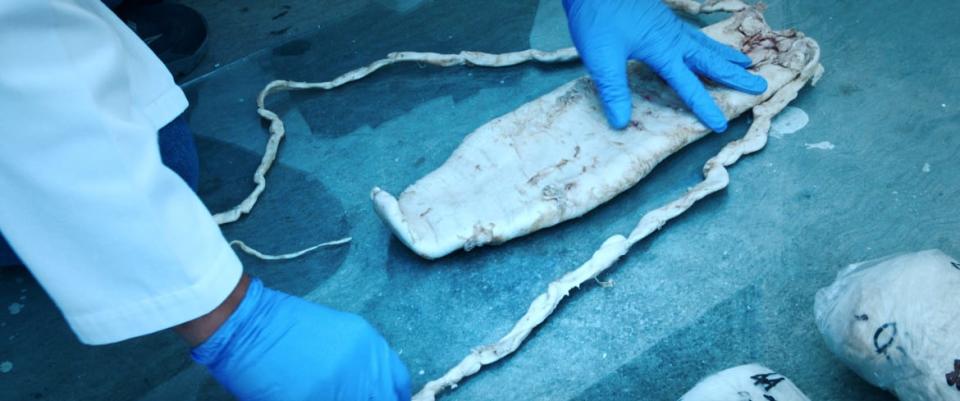The Ugly War Over the ‘Cocaine of the Sea’

The vaquita, the world’s smallest and most endangered whale, is nearly extinct due to China’s demand for the swim bladders, also known as ‘maws,’ from a giant Mexican fish called totoaba. With fisherman using large gillnets to illegally fish for totoabas, vaquitas have become the victim of its by-catch.
Fewer than 15 vaquitas are left in the Sea of Cortez, surrounded by miles of illegal gillnets and threatened by greed, violence, and indifference.
In the effort to save the vaquita from extinction, I started investigating the trafficking of the totoaba fish in Baja California three years ago with my undercover teams. We soon realized that it was about much more than totoaba fishing and poor fishermen, and that what everyone considered an environmental problem was in fact a serious crime problem.
Pretending to be illegal buyers, we covertly video-recorded Chinese traffickers in Mexico explaining to our operatives how they use totoaba to launder money back to China, tens of millions of dollars every year, and how some of them reinvested the profits into other illicit activities.
Additional investigative work by our teams revealed how the Chinese mafia in Mexico joined forces with former and current Mexican narco-traffickers to exploit this incredible opportunity to make money fast and with very low risks, bribing and threatening anyone who blocked their lucrative trades.

Totoaba caught in a net.
The retail price of totoaba maw on the black market in China has been recorded by undercover teams to be over $50 per gram—higher than gold. A fisherman in the Sea of Cortez can earn more in one night catching a few totoabas than they may otherwise earn in a year.
It was clear to us that we needed much more than a conservation plan to save the vaquita and the marine life in the Sea of Cortez, called the “aquarium of the world” by Jacques Cousteau. We needed a state-of-the-art undercover intelligence operation to identify the key players behind the destruction of this incredible marine ecosystem and help law enforcement destroy the international illegal supply chain from within.
Despite billions of dollars spent by governmental agencies and NGOs in past years, poaching, trafficking, illegal fishing, and illegal logging are out of control, and environmental criminals are always ahead of law enforcement. Large investments in conservation have slowed down the loss of biodiversity, but just a fraction of this money has been spent in fighting the war against environmental crime. The catastrophic results sit right under our very eyes.
With everyone disproportionately focused on only the two ends of the illegal supply chains—local poachers and the final consumers—two issues easy to explain and to fundraise for, nobody is really tackling the complex upper layers of environmental crime: the puppeteers made of transnational criminal organizations, middle-men operating from transit countries, businessmen, and corrupt government officials.
Existing efforts are failing, our approaches myopic, and prevailing academic tactics are ill-equipped to counter transnational criminal organizations and complex webs of traffickers. An outdated risk-averse infrastructure rooted mostly in science, habitat conservation, and activism to fight sophisticated criminals and Machiavellian transnational networks is not only inadequate, it’s naïve. We’ve omitted a fundamental practice that has been used for centuries to combat criminals and global nemeses: Intelligence.
Intelligence is a key capability used to combat international threats like terrorism, narco-trafficking, weapons of mass destruction, and other major organized crime. And yet, it’s absent in our approach to battle a skyrocketing spike in environmental crime.
As for the vaquita, we identified the complex factors surrounding the possible extinction of this iconic species and the destruction of an incredibly important ecosystem. Efforts now must shift toward the protection of the Gulf of California in general.

Confiscated fresh totoaba swim bladder at a Mexican police station.
Our organization has worked tirelessly to gather the intelligence needed by authorities to disrupt the totoaba supply chain, and ultimately, curb illegal fishing in the Gulf of California and prevent the vaquita and other species from going extinct. Crucial information gathered during our operations only appears in a Confidential Intelligence Brief (CIB) that has been prepared and submitted to law enforcement authorities in Mexico, China, and the United States. The CIB contains all the non-redacted data gathered regarding the key players, their networks, and the complete modus operandi of these traffickers and traders, as well as hundreds of photos and hours of relevant undercover footage.
The whole story is told, for the first time, in the National Geographic documentary Sea of Shadows, featuring our teams and other conservationists fighting for the vaquita.
Ranked the world’s fourth largest criminal activity in the world, environmental crime is now orchestrated at the same level of complexity as every other major criminal enterprise. We need to acknowledge that environmental crime at this scale is a form of terrorism against Earth.
With intelligence, we can build a new, Promethean defense in the conservation model, and with the right professionals and the necessary tools, we can preemptively guard our wildlife, forests, and oceans. Our Planet.
Andrea Crosta is the founder of the Los Angeles-based Earth League International, and the creator of Project WildLeaks, the world’s first whistleblowing initiative dedicated to environmental crime.
Get our top stories in your inbox every day. Sign up now!
Daily Beast Membership: Beast Inside goes deeper on the stories that matter to you. Learn more.

